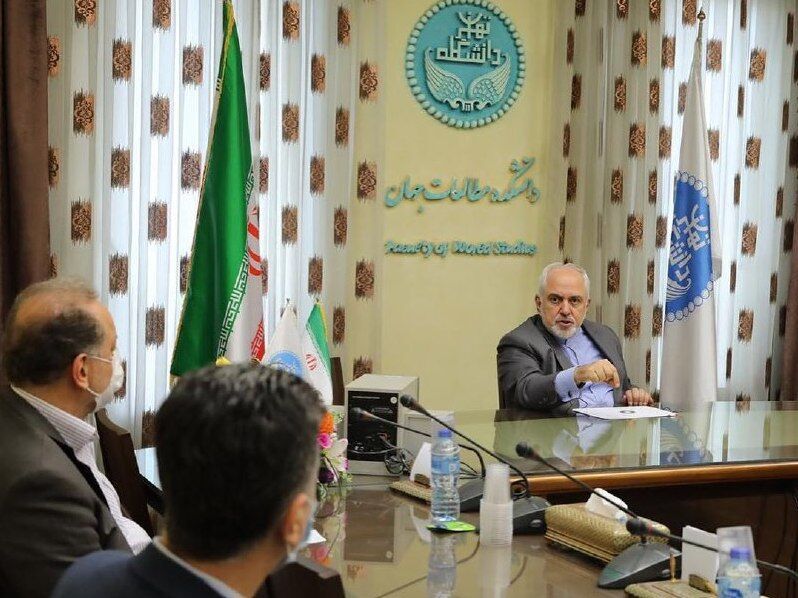ID :
572580
Mon, 08/03/2020 - 21:20
Auther :
Shortlink :
https://oananews.org//node/572580
The shortlink copeid
FM Zarif: Miscalculations by superpowers led to disastrous consequences

Tehran, Aug 3, IRNA - Iranian Foreign Minister Mohammad Javad Zarif on Monday said in a virtual lecture that miscalculations carried out by superpowers have led to the disastrous consequences in the world.
He delivered a live lecture named “Characteristics of Transitional Period" through the Instagram social networking service, adding that the miscalculations committed in the process of a new global order, are far more catastrophic than the mistakes that other countries have made.
Referring to the US invasion to Iraq as one of the superpowers’ miscalculations, he stated that once the attack was conducted, there was a lot of ambiguity about it but one thing was very clear; that from the very beginning it was obvious that the move would lead to the growth of extremism in the world.
Extremism has been caused by miscalculations, he said, adding that the major problem that has led to the current sad situation is the lack of understanding and the miscalculation that has led to the mistakes of the regional powers and superpowers.
"We have been experiencing the era for 30 years," the top diplomat said, noting that "we should not predict the time when it will end. It is a long period. The Cold War era lasted about 50 years.
Zarif named “intense competition” as one of the characteristics of the Transitional Period, adding that the competitions have short-term as well as medium-term objectives.
Elsewhere in his remarks, the high-ranking official pointed out that "we cannot have simple presumptions of the facts".
He went on to note that the presumptions and inflexible thoughts could lead to disasters.
"Today poverty is a global challenge. The results of this are universal and comprehensive. Solving the challenge by one or more states is not possible. The challenges require a global and collective effort," Zarif underlined.
He further noted that the outbreak of the coronavirus is also a global challenge that could be dealt with a global solution.
Commenting on terrorism and September 11, the Minister termed terrorism as a global challenge.
He added that creating security requires global determination.
"No state alone can create it in the world. The security of each country is regarded as the security of others. That is why the creation of security in the world needs collective effort," Zarif added.
These are the facts related to the global concept of security, he said, noting that however, politicians have always been against this notion because they always discuss what is in it for them and what is in it for the others.
Zarif reiterated that this should not make us ignore the fact that the security of a society cannot be created at the price of creating insecurity for other communities.
There are big economic games for weapon manufacturers in the globe that prevent access to real security for states, he underscored.
In the Transitional Period, the consequences can be predicted hard as every country is in a state of "becoming" and trying to act in a revolutionary way and change the future image based on their interests, he urged.
Some role players such as the United States have tried to take control of the situation by previous rules and their military superiority during the Period, but their behavior led to disaster, he reaffirmed.
In the wake of the US-led Persian Gulf War against Iraq, the world was engaged in war every year, and that the US sought to impose its superiority in the order of the world, he underscored.
He reiterated that assumptions lead to disasters, calling for holding talks. In situations like these, those with rigid thoughts are extremely dangerous.
Extremism is more important than nationalism in the US and some areas of the Western Bloc, he highlighted.
Once attending the UN General Assembly, Trump said everyone should seek to secure their national interests, Zarif added.
It is natural that all countries follow their national interests, the high-profile diplomat said, adding that it is a consequence and reaction to the globalization if someone shows up in the hall of an international body and declares that the interests of others are unimportant.
Touching on the criteria of the globalization, Zarif underscored that there is no monopoly on information and that you do not need to be an emperor of the media to publish information.
This does not mean that media emperors have been destroyed. They are there but you do not need them, he stressed.
In the past, your voice was not heard without relying on the media emperor, but today you can convey the message to the world via a camera, he further noted.
Elaborating on the factors of globalization, the diplomat said that today, every human being can be a global actor.
The world is going through the challenges that cannot be resolved by a mere country or coalition and they should be taken into consideration universally, he urged.
Not paying enough attention to the issue has led to a false computational understanding in the past 30 years, he pointed out.





